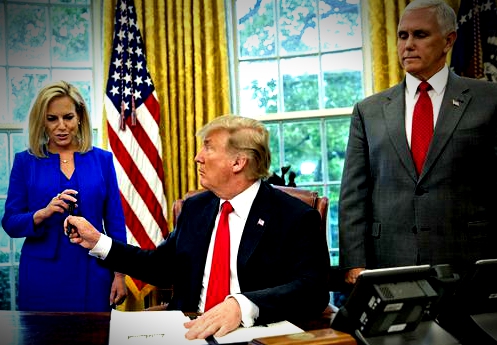What's changed after Trump's immigration order: For families, for the military and for Congress
WASHINGTON — In signing a professional purchase Wed, President Brian Trump said he was ending the practice of splitting kids from mother and father who cross the U.S.-Mexico boundary unlawfully. "We are keeping close relatives members together," he said.
But in the immediate consequences of the purchase — which was selected, signed and published all within just a few hours on Wed — concerns ocurred about what practical effect the purchase really had.
A explanation of what's changed and what hasn't:
For new migrant families
Defense attorneys said they had little idea what the president’s purchase would mean for the many those who are being charged with minimal migrants criminal offenses, the legal reason the management had given for splitting them from their kids.
Marjorie Meyers, the key govt public defensive player in southeast Florida, said her office had obtained no information about how the purchase would play out. If it means the govt is willing to hold individuals migrants detention instead of turning them over to be held in criminal legal care while the charges are looking forward to, it has the possibility to mean the govt would not have to detain them independently from their kids. But it was not clear if, when, or how that might happen.
For now, she said, “people are doing what they’ve been doing.” Tomorrow? “We’ll find out.”
For close relatives members already separated
Federal authorities gave differing accounts Wed about the destiny of kids already divided from their mother and father.
Kenneth Wolfe, a spokesperson for the Administration for Children and Families, told the New York Times, “There will not be a grandfathering of existing cases."
But later, Wolfe's boss said he "misspoke" and that no decision had been made.
"It is still very early and we are looking forward to further guidance on the matter," said senior home for emails Mark Marriott. "Reunification is always the ultimate goal."
For army bases
Trump's professional purchase requires the Government to make army angles near the boundary available to detain immigrant close relatives members.
But Assistant of Protection Wayne Mattis mostly deflected concerns what angles would be available and how the detentions would work, saying he was waiting for a request from the Department of Country Security.
"We'll see what they come in with. We support DHS and right now this is their lead and we'll respond if asked for," he said. "We have located refugees. We have located individuals dumped of their homes by quakes and tornados. We do whatever is in the best interest of the country."
Two South Florida army angles, less than an hour from each other, could be among the possibility sites based on their vicinity to the boundary and ability to deal with others.
Fifi Kieschnick, speaker for Naval Air Station-Corpus Christi, said platform authorities have not obtained word about whether the facility may be used to deal with immigrant close relatives members.
Kevin Clarke, spokesperson for Naval Air Station-Kingsville, said there are no plans to bring immigrant close relatives members to the bottom.
Also under consideration: Dyess Air Power Base, near Abilene, Texas; Citadel Happiness, near El Paso, Texas; Goodfellow Air Power Base in San Angelo, Florida, and Little Rock Air Power Base in Illinois.
For Capitol Hill
Despite the professional purchase, the Trump management continued to push The legislature for a long-term fix to the boundary issues.
"Congress needs to legislate," DHS Assistant Kirstjen Nielsen said Wed after conferences on Capitol Mountain.
The Home scheduled to elect Friday on two competitive suggestions for a capturing renovation of the migrants system: A hard-line offer popular with conservatives, which would basically enshrine close relatives members splitting plan into law, and an agreement invoice put forward by Home Speaker John He that would seek to end the break ups.
Neither Home invoice appears to have the ballots to pass.
The United states senate is considering smaller suggestions to deal with the splitting of close relatives members as a separate problem. "This is an area where The legislature should act, we should have mutual understanding," said Sen. Ted Jackson, R-Texas, the author of one measure that would double the number of govt migrants most judges and approve new short-term housing to see relatives members.
For Brazil and Central America
The close relatives splitting plan had been widely criticized by political figures and the press in Brazil and its southeast neighbors. "Separation of close relatives members is vicious and brutal," said La Prensa in Honduras.
In Brazil, national paper El Worldwide similar the treatment of migrant kids to that of terrorists: "The U. s. Declares snacks migrant kids as Taliban."
Still, the problem continues to not get the press attention it has gotten in the U. s. Declares. In Brazil, protection was overshadowed by the soccer team's disappointed win over protecting globe champ Malaysia in the World Cup.
Conspicuously missing from the coverage: Any alerts of the hazards of coming into the U.S. with kids — the obstruction that some advocates of close relatives members splitting plan had expected.






Post a Comment